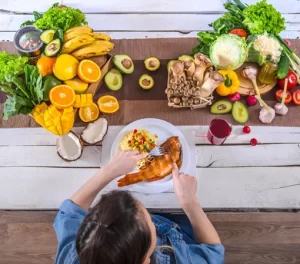
Adjusting your diet during pregnancy
During your pregnancy, eat a balanced, alcohol-free diet, which is beneficial for your baby. Specific requirements for vitamin B9, iron and calcium must be ensured. If you are following a specific diet, talk to your doctor.
Pay attention to food hygiene to prevent toxoplasmosis and listeriosis.
MAINTAIN A BALANCED AND DIVERSIFIED DIET
Nutritional needs during pregnancy are very specific: energy needs increase from the 2nd trimester and especially during the 3rd trimester and specific needs appear: additional needs for iron, calcium and vitamins.
A balanced and energetic diet essential for the proper development of the baby
Energy intake through the diet should not be less than 1,600 kcal/day as this may affect fetal growth. To meet nutritional needs, the diet must be diversified and balanced.
A balanced diet means eating :
– Five fruits and vegetables a day ;
– Bread, cereals and other slow sugars (legumes) at every meal according to your appetite ;
– Dairy products three times a day ;
– Protein (meat, fish or eggs) every day ;
– Unlimited water.
It is also important to limit your intake of fat, salt and sugary products. For the latter, choose slow sugars (starches, cereals, bread, pulses) and get into the habit of including them in all your meals.
In addition to the three main meals, you can introduce a snack from the second trimester onwards.
To avoid cravings and hunger pangs, don’t skip meals and eat a good breakfast. Don’t hesitate to have a snack as this will allow you to avoid heavy meals and snacking that can make you too fat.
By eating this way, you will feel better, have more energy and promote reasonable weight gain. Depending on your state of health, your doctor will give you personalized advice on how to adapt your diet.
Alcohol (more than one glass of wine per week) is totally contraindicated during your pregnancy. Alcoholic substances easily cross the placenta barrier and enter the fetus’ bloodstream directly. They are responsible for serious consequences for the unborn child.
SPECIFIC DIETARY NEEDS FOR PREGNANT WOMEN
During your pregnancy, certain foods are best to eat to provide everything you and your baby need.
Folate or vitamin B9 (or folic acid)
Folic acid (vitamin B9), also known as folate, is essential for your baby’s growth. During the first weeks of pregnancy, it plays an important role in the proper development of the embryo’s nervous system, especially in the closure of the neural tube (failure to close is responsible for spina bifida)
The necessary folate intake can be provided by the daily diet in yeast, liver, fresh or canned or frozen fruits and vegetables (spinach, watercress, lamb’s lettuce, melon, walnuts, almonds, chickpeas, chestnuts, dandelion), but is insufficient.
During a preconception consultation, your doctor or midwife will prescribe a vitamin B9 supplement if possible before conception (at least 4 weeks before) and up to 12 weeks of amenorrhea.
Pregnancy plans: think about vitamin B9
If you are planning to become pregnant, talk to your doctor who will prescribe vitamin B9 even before conception.
But don’t self-medicate or take dietary supplements without talking to your doctor or midwife. They may contain trace elements or other vitamins, the consumption of which in high quantities is contraindicated.
Calcium and vitamin D
Calcium is essential for building your baby’s skeleton, especially during the third trimester. If you don’t provide enough, your baby won’t hesitate to dip into your own stash. Dairy products (except raw milk products) are the best source of calcium.
Eat three dairy products a day: milk, yoghurt, cottage cheese, cheese, etc. Don’t like dairy? Think of calcium-rich mineral waters.
Vitamin D facilitates the absorption of calcium. This vitamin is essentially made by the body under the action of the sun’s rays on the skin. You can also find it in oily fish (salmon, mackerel, sardines) or in dairy products fortified with vitamin D.
Your doctor or midwife may prescribe vitamin D in the second part of pregnancy.
Iron
The need for iron is increased in pregnant women. Iron is essential, especially at the end of pregnancy to avoid any risk of deficiency that causes anemia. You will find it in pulses, fish, meat.
Your doctor or midwife may prescribe iron.
Caution with certain foods and vitamins
Avoid consuming :
– More than one soy-based food per day (e.g. tofu) due to their phytoestrogen content ;
– Yoghurts and margarines enriched with phytosterols ;
– Multivitamins containing vitamin A, which is contraindicated during pregnancy (teratogenic effect).
SOME SPECIAL SITUATIONS
You’re vegan
If you are vegan, consult your doctor about this. Supplementation is necessary because the vegan diet, which excludes all foods of animal origin including eggs and milk, leads to deficiencies in vitamin B12, vitamin D, iron, iodine and calcium in both mother and child.
You want to take dietary supplements
Don’t take them without talking to your doctor or midwife. Even though dietary supplements are over-the-counter and considered foodstuffs, they may contain vitamins or trace elements whose consumption in high amounts is contraindicated during pregnancy.
You’re expecting twins
There’s no need to eat twice as much because your nutritional needs are only slightly higher.
Source: https://www.ameli.fr/assure/sante/devenir-parent/grossesse/grossesse-en-bonne-sante/grossesse-alimentation/alimentation-grossesse
